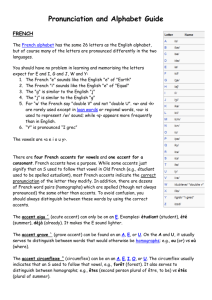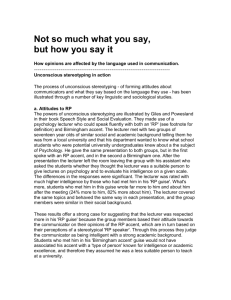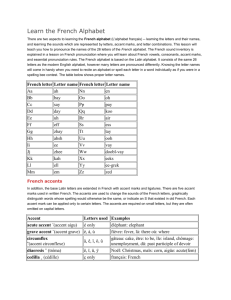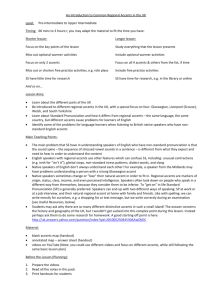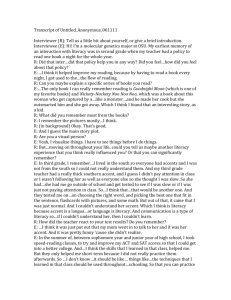here - ELF Pronunciation
advertisement
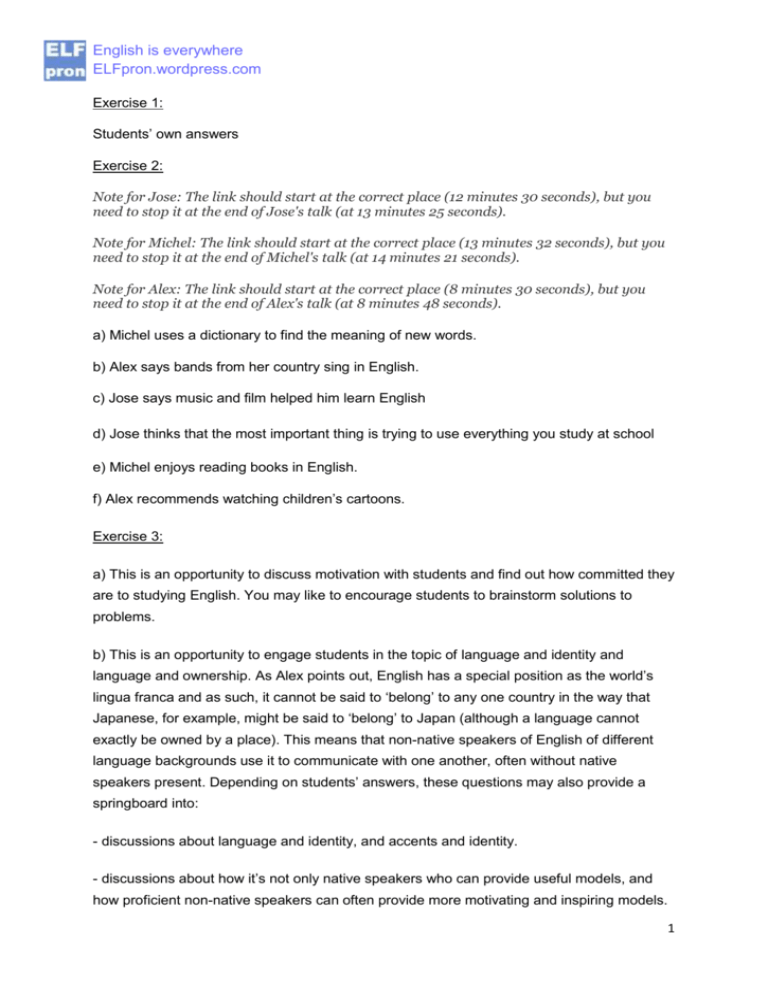
English is everywhere ELFpron.wordpress.com Exercise 1: Students’ own answers Exercise 2: Note for Jose: The link should start at the correct place (12 minutes 30 seconds), but you need to stop it at the end of Jose's talk (at 13 minutes 25 seconds). Note for Michel: The link should start at the correct place (13 minutes 32 seconds), but you need to stop it at the end of Michel's talk (at 14 minutes 21 seconds). Note for Alex: The link should start at the correct place (8 minutes 30 seconds), but you need to stop it at the end of Alex's talk (at 8 minutes 48 seconds). a) Michel uses a dictionary to find the meaning of new words. b) Alex says bands from her country sing in English. c) Jose says music and film helped him learn English d) Jose thinks that the most important thing is trying to use everything you study at school e) Michel enjoys reading books in English. f) Alex recommends watching children’s cartoons. Exercise 3: a) This is an opportunity to discuss motivation with students and find out how committed they are to studying English. You may like to encourage students to brainstorm solutions to problems. b) This is an opportunity to engage students in the topic of language and identity and language and ownership. As Alex points out, English has a special position as the world’s lingua franca and as such, it cannot be said to ‘belong’ to any one country in the way that Japanese, for example, might be said to ‘belong’ to Japan (although a language cannot exactly be owned by a place). This means that non-native speakers of English of different language backgrounds use it to communicate with one another, often without native speakers present. Depending on students’ answers, these questions may also provide a springboard into: - discussions about language and identity, and accents and identity. - discussions about how it’s not only native speakers who can provide useful models, and how proficient non-native speakers can often provide more motivating and inspiring models. 1 English is everywhere ELFpron.wordpress.com - discussions about the effect the dominance of English has on minority languages. c) Possible answers: Books that have recently been made into popular films include the Twilight series and the Hunger Games series. d) Students might need to work in groups, rather than pairs, to generate ideas. Exercise 4: Note for Joanna: The link should start at the correct place (9 minutes 26 seconds), but you need to stop it at the end of Joanna's talk (at 10 minutes 01 seconds). a-e If you learn new words easily, you should focus on vocabulary. b-f If you want to make friends, you should try speaking as much as possible. c-d If you are structured and organised, you should focus on grammar. Exercise 5: Discuss these questions with a partner: a and b) This is an opportunity to encourage students to think about learner styles, such as visual, auditory and kinaesthetic, which can help to inform what activities you do in class, but also help students to think about how they can study outside class. Exercise 6: The link should start at the correct place (12 minutes 27 seconds), but you need to stop it at the end of Zhang's talk (at 13 minutes 22 seconds). a) In the car, in bed and in the office. b) She studies in these places because she has a busy full-time job and does not have time to study much. 2 English is everywhere ELFpron.wordpress.com Exercise 7: b) Possible answers: while in the gym, going for a run, doing the grocery shopping, doing housework, looking after children (e.g. reading them a story in English), labelling items around your house with post-it notes in English, even having a shower (e.g. you could tune a shower radio into an English-speaking channel)! Exercise 8: N.B The following clip from Amanda’s interview is not suitable for use with students under 18, as she suggests being friends on Facebook with people you do not know. Note for Amanda: The link should start at the correct place (9 minutes 50 seconds), but you need to stop it at the end of Amanda's talk (at 11 minutes 30 seconds). Note for Tomas: The link should start at the correct place (13 minutes 25 seconds), but you need to stop it at the end of Tomas' talk about gaming (at 14 minutes 41 seconds) before he continues to talk about a new topic (travel). a) Amanda puts her website settings in English. b) Tomas played a lot of role-playing games (RPG) when he was younger. Exercise 9: b) Remind students of the dangers of adding friends on Facebook that you do not know in person. If students wish to add friends they do not know, elicit suggestions for internet safety such as avoiding sharing any personal details or photographs. Exercise 10: Note: Just play the audio clips for the small part necessary to hear the word. These exercises aim to raise students’ awareness of the variation in English pronunciations around the world, and to reflect on the fact that everyone has an accent but someone’s accent usually seems more noticeable when you’re not familiar with it. The exercises also help students notice the way specific sounds are often pronounced by speakers with a Brazilian accent or Chinese accent. Even if students do not expect to interact with speakers of these language backgrounds, they will still benefit from developing the skill of noticing specific sounds, which they may be able to transfer to situations when they hear other accents. This encourages them to be more flexible as they listen and take more responsibility for ensuring communication is successful. 3 English is everywhere ELFpron.wordpress.com a) Brazilian, Congolese, Romanian, and Chinese b) It is usually easier to understand an accent that you are more familiar with. It might also be easier to understand an accent which is more similar to your own accent. c) Spend more time listening to people with this accent in order to become more familiar with it. Try to notice which sounds are pronounced differently to the way you say them, because these are probably the ones causing you difficulty. Then try to ‘turn on a switch’ which applies that new way of pronouncing a sound to other words with the same sound. If you are speaking to someone and you don’t understand something they said, try to be as specific as possible about which word you didn’t understand so that they can clarify it for you. d) The way that Brazilian and Chinese speakers often pronounce the /l/ at the end of words (the so-called ‘dark l’) might sound like a /w/ . e) The sound at the end of ‘breathe’ is similar to /z/, and the sound at the end of mouth is similar to /s/. The sound at the start of ‘that’ is similar to /d/. Research shows these pronunciations do not damage intelligibility* and there are many accents around the world which pronounce ‘th’ words in these ways. It is just important for students to recognise that there is such variety and be aware of how the different pronunciations compare to their own in order to help them when they are listening. * According to the Lingua Franca Core, which is a list of pronunciation features shown by data to be the most important for intelligibility, set out by Jennifer Jenkins in her 2000 book The phonology of English as an International Language: New models, new norms, new goals (Oxford University Press). 4



